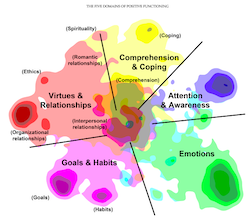"Can you put 'worry' in the calendar?" I asked my partner last Tuesday, standing in our kitchen with my phone in one hand and a growing sense of dread in my chest. I was looking at Thursday's schedule—back-to-back meetings, a dentist appointment, dinner with friends I hadn't seen in months—and my brain was already three steps ahead, catastrophizing every possible thing that could go wrong.
He laughed, thinking I was joking. I wasn't.
For neurotypical people, calendars are straightforward: put the thing in the slot, show up at the time, done. But for those of us with ADHD or anxiety or both, calendars are emotional minefields. Every appointment carries invisible weight—the mental prep time, the recovery time, the energy it'll take to context-switch, the worry about what happens if it runs long or goes poorly or conflicts with something else we forgot we cared about.
The Hidden Labor of Planning
Here's what no productivity guru tells you: for some brains, the act of planning is itself exhausting. Not because we're lazy or disorganized (okay, maybe a little disorganized), but because we're doing emotional calculus that nobody else seems to need.
Take that Thursday I mentioned. A neurotypical person might see three commitments spread across eight hours. My brain sees:
- Will I have enough energy for the second meeting if the first one goes badly?
- What if the dentist runs late and I'm stressed for dinner?
- Do I have the right clothes for dinner, and when will I have time to figure that out?
- What if I'm overstimulated from socializing and can't sleep that night?
- Should I cancel something to create buffer space, and if so, which thing makes me the least terrible person for canceling?
By the time I've finished "planning" my day, I need a nap.
Enter the AI Planning Therapist
This is where Gemini comes in, though not in the way you might expect. I didn't start using AI for scheduling because I wanted to be more productive. I started using it because I was drowning in the emotional overhead of trying to exist in a world designed for brains that work differently than mine.
It began with a simple prompt: "I have these three things on Thursday and I'm already feeling overwhelmed. Can you help me think through what might be making this feel so hard?"
What followed was the kind of conversation I'd never had with a traditional planning tool. Gemini didn't just suggest time blocks or productivity hacks. It helped me map the emotional landscape of my day.
"What specifically about each commitment feels challenging?" it asked. "Are there particular transitions that tend to be difficult for you? What would make each part of the day feel more manageable?"
Suddenly, I wasn't just planning activities—I was planning for my actual human needs.
Mapping Stress Before It Spirals
The breakthrough came when I realized I could ask Gemini to help me anticipate my own patterns. "Based on what I've told you about how my brain works, what should I be thinking about for this week?"
The AI became like having a personal stress meteorologist. It would look at my schedule and say things like: "I notice you have two social events back-to-back on Saturday. Given what you've shared about needing downtime after socializing, you might want to plan some buffer space Sunday morning."
Or: "Your Wednesday looks manageable, but you mentioned that Tuesdays usually drain you. Should we think about what Wednesday's energy level might realistically be?"
This wasn't revolutionary because the AI was particularly brilliant—it was revolutionary because it was paying attention to patterns I'd never thought to track systematically.
The Questions That Changed Everything
Instead of fighting against my brain's tendency to worry and overthink, Gemini helped me use those tendencies strategically. It taught me to ask different questions when planning:
- What's my energy level likely to be, not just what time is available?
- What kind of recovery time do I need between different types of activities?
- What are the hidden emotional costs of this commitment?
- What would make this feel sustainable instead of just possible?
These aren't questions that show up in typical productivity advice, but they're the questions that make the difference between a schedule that works on paper and one that works in real life.
Beyond Traditional Time Management
The more I worked with AI on planning, the more I realized how inadequate traditional time management is for neurodivergent brains. We're not just scheduling our time—we're scheduling our energy, attention, emotional capacity, and ability to cope with uncertainty.
Gemini helped me create what I started calling "realistic planning"—the kind that accounts for the fact that some days my brain works like a finely tuned machine and other days it works like a toddler who missed their nap and had too much sugar.
"I have a presentation tomorrow and I'm spiraling about it," I'd type. "Can you help me figure out what I actually need to prepare versus what my anxiety thinks I need to prepare?"
The AI would walk through it with me: What are the actual requirements? What's the worst realistic outcome? What would adequate preparation look like versus perfect preparation? How can you set yourself up to feel confident without burning out on prep work?
The Emotional Labor Audit
One of the most valuable things Gemini taught me was to recognize emotional labor as a real resource that needs to be budgeted. That phone call with the insurance company? It's not just 20 minutes on the calendar—it's 20 minutes plus the mental energy to navigate a frustrating system plus the recovery time afterward.
The AI helped me start tracking these hidden costs: "Looking at your week, I see several tasks that typically require significant mental energy. How might you want to distribute those so you're not hitting them all when you're already depleted?"
This was the first time anyone—human or AI—had acknowledged that some tasks are harder than others not because they take more time, but because they take more of you.
The Ripple Effect
Once I started planning with my actual brain instead of against it, everything else got easier. I stopped double-booking myself emotionally. I stopped agreeing to things on my high-energy days that would be impossible on my low-energy days. I started building in the kind of buffer space that prevents small stresses from becoming major meltdowns.
My partner noticed the change before I did. "You seem less frantic lately," he said one evening. "More like you're working with your schedule instead of being terrorized by it."
He was right. I'd stopped treating my calendar like an adversary and started treating it like a tool for taking better care of myself.
The Worry Calendar
So yes, I can put "worry" in the calendar now. Not as a joke, but as a legitimate recognition that emotional processing takes time and energy. Sometimes that looks like scheduling "processing time" after difficult conversations. Sometimes it's blocking out "buffer space" around high-stress activities. Sometimes it's just acknowledging that some days require more emotional labor than others and planning accordingly.
Gemini doesn't make the worrying go away—that's not the goal. Instead, it helps me worry more strategically. To channel my brain's natural tendency to anticipate problems into actually useful planning instead of paralyzing anxiety spirals.
Your Turn to Experiment
If you're someone whose relationship with planning feels more like a wrestling match than a helpful tool, maybe it's time to try a different approach. Ask your AI of choice: "I'm struggling with [specific planning challenge]. Can you help me think through what might be making this feel so hard?"
Don't aim for perfect productivity. Aim for sustainable planning that works with your brain instead of against it. Because the goal isn't to become someone who never struggles with scheduling—it's to become someone who has tools for navigating those struggles in a way that honors both your commitments and your humanity.
The calendar is big enough for your worry. The question is: are you ready to make space for it?
What emotional labor have you been leaving out of your planning? Your calendar might be more honest than you think.
Stay Informed and Inspired
Join our community of forward-thinkers and gain insights into AI communication and storytelling. Subscribe to our newsletter for the latest updates and exclusive resources.





